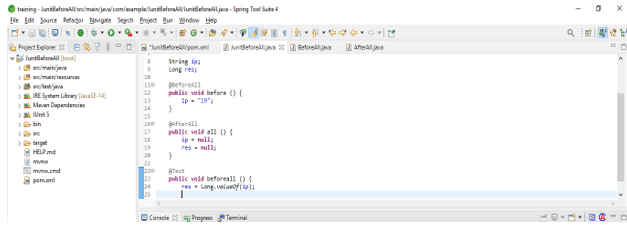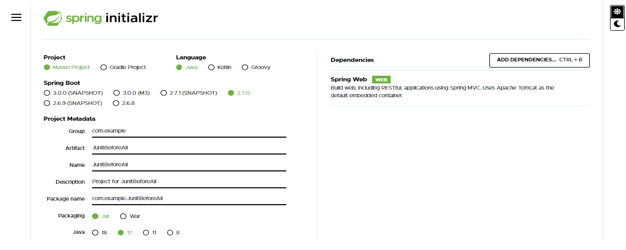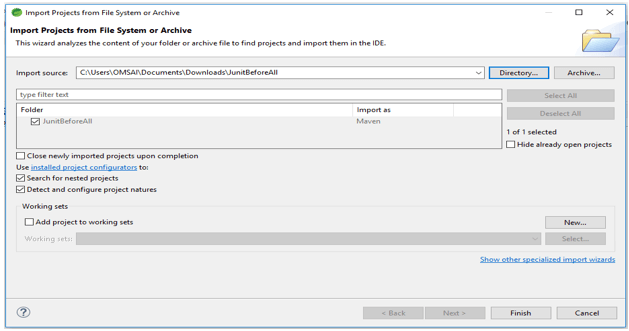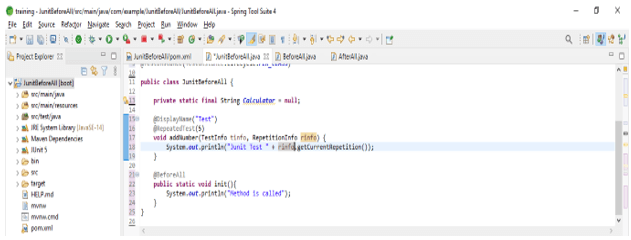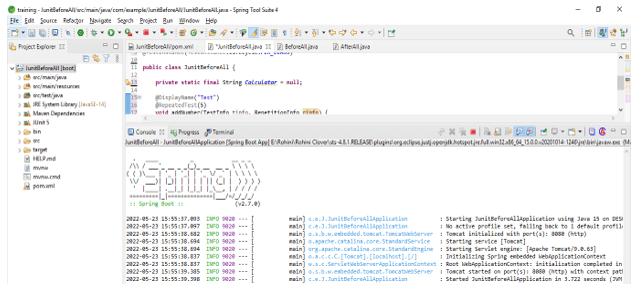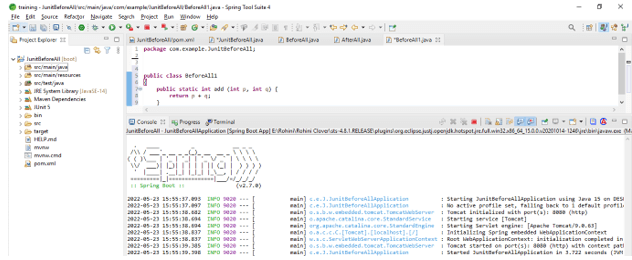Updated February 14, 2023
Definition of JUnit BeforeAll
Junit beforeall is used to signal that all the annotated methods will be executed before all tests in a test class which is a current. The @BeforeEach method will be implemented as per the given test class. The Beforeall method will also contain the return type as void; this annotation is not private but static by default. This method will not support the nested test classes.

What is JUnit BeforeAll?
- We can use the beforeall method to declare the parameters resolved by using ParameterResolvers optionally.
- The @BeforeAll annotation method will be inherited from the superclass, which is not overridden or hidden. The @BeforeAll method from the superclasses is executed before the methods in the subclasses.
- We can also use junit @BeforeAll annotation as a meta-annotation for creating the annotation, which was custom and inherits the @BeforeAll method.
- Junit @BeforeAll annotation is used to signal that associated with a method executed before the annotation of @Test and the @TestFactory methods in the current class.
JUnit BeforeAll Type
- While doing unit testing, we need to use beforeall annotation by using no static methods and by using methods of tear-down modes. For instance, a nested class is used to interface default methods.
- The below example shows junit beforeall with the non-static method are as follows. In the below example, we are creating a class name as JunitBeforeAll. In the below example, we have defined two-variable first is ip, and the second is res; for the ip variable, we have defined the data type as a string, and for the res variable, we have defined the data type as long. Then we have to define the annotation name as @BeforeAll. In this annotation, we have to define the method name, use a variable as ip and assign 19 values to the ip variable. Then we have to define the annotation name as @AfterAll. In this annotation, we described the method name as all and used variables as ip and res, assigning null values to both variables.
- Then we are using the @Test annotation; in that annotation, we have defined the method name as beforeall and described the variable name as a res.
Code –
public class JunitBeforeAll {
String ip;
Long res;
@BeforeAll
public void before () {
ip = "19";
}
@AfterAll
public void all () {
ip = null;
res = null;
}
@Test
public void beforeall () {
res = Long.valueOf(ip);
}
}
- We can also use @TestInstance annotation with the @BeforeAll method in junit. The junit @BeforeAll annotation is used to configure a test’s life cycle. If suppose we have not declared the same in our class, then lifecycle mode is by default as per_method. To prevent our class from throwing an exception, we need to annotate the same as @TestInstance. In the below example, we have defined two-variable the first is junit1, and the second is junit2; for the junit1 variable, we have defined the data type as a string, and for the Junit2 variable, we have defined the data type as long. Then we have to define the annotation name as @BeforeAll. In this annotation, we described the method name as before and used a variable as junit assigning 25 values to the junit1 variable. Then we have to define the annotation name as @AfterAll. In this annotation, we have to define the method name as BeforeAll and use the variable as junit1 and junit2, assigning null values to both variables.
- Then we are using the @Test annotation; in that annotation, we have defined the method name as junitbeforeall and described the variable name as junit2.
Code –
@TestInstance (TestInstance.Lifecycle.PER_CLASS)
public class JunitBeforeAll {
String junit1;
Long junit2;
@BeforeAll
public void before () {
junit1 = "25";
}
@AfterAll
public void BeforeAll () {
junit1 = null;
junit2= null;
}
@Test
public void junitbeforeall () {
junit2= Long.valueOf (junit1);
}
}
JUnit beforeall Annotation Example
- The below steps show an example of junit beforeall is as follows. We are creating the project name as JunitBeforeAll. In this step, we are making the project template of junit beforeall in spring boot. We are providing the project group name as com.example, artifact name as JunitBeforeAll, project name as JunitBeforeAll, and selected java version as 11. We are defining the version of spring boot as 2.7.0
Group – com.example
Artifact name – JunitBeforeAll
Name – JunitBeforeAll
Spring boot – 2.7.0
Project – Maven
Java – 11
Package name – com.example. JunitBeforeAll
Project Description – Project for JunitBeforeAll
- In this step, we extract the downloaded project and open the same using the spring tool suite.
- In this step, we check all the project structures and their files. Also, we are checking whether that pom.xml file is created or not. If suppose this file is not created, we need to create the same manually. However, this file is created in the example below, so we do not need to create it manually.
- In this step, we are adding the junit dependency in junit beforeall. We are adding junit dependency as follows.
Code –
<dependencies>
<dependency>
<groupId> org.junit.jupiter </groupId>
<artifactId> junit-jupiter-engine </artifactId>
<version> 5.3.1 </version>
<scope> junit- beforeall </scope>
</dependency>
<dependency>
<groupId> junit </groupId>
<artifactId> junit </artifactId>
<version> 4.12 </version>
</dependency>
</dependencies>
<reporting>
<plugins>
<plugin>
<groupId> org.apache.maven.plugins </groupId>
<artifactId> maven-surefire-report-plugin </artifactId>
<version> 2.19.1 </version>
</plugin>
</plugins>
</reporting>- After adding the dependency in this step, we class, and in that class, we use @BeforeAll annotation.
Code –
public class JunitBeforeAll {
private static final String Calculator = null;
@DisplayName ("Test")
@RepeatedTest (5)
void addNumber (TestInfo tinfo, RepetitionInfo rinfo) {
System.out.println ("Junit Test " + rinfo.getCurrentRepetition ());
}
@BeforeAll
public static void init () {
System.out.println ("Method is called");
}
}
- After adding the class by using the @BeforeAll annotation in this step, we are using add method by using another class.
Code –
public class BeforeAll1
{
{
return p + q;
}
}
Conclusion
We can also use junit @BeforeAll annotation as a meta-annotation for creating the annotation, which was custom and inherits the @BeforeAll method. Junit beforeall is used to signal that all the annotated methods will be executed before all tests in a test class which is a current.
Recommended Article
This is a guide to JUnit BeforeAll. Here we discuss the Definition, What is JUnit BeforeAll with examples and code implementation. You may also have a look at the following articles to learn more –
